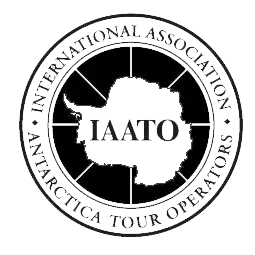
AdventureSmith Explorations is proud to be a member of IAATO and we wholeheartedly embrace their commitment to environmental standards for small ship cruise travel to Antarctica. Safe and sustainable operations are a cornerstone of our business, and membership in an organization such as IAATO is one of the many ways we can honor this commitment. IAATO has many benefits and resources that aid AdventureSmith clients as they research and prepare for their Antarctic cruise.
What is IAATO?
The International Association of Antarctica Tour Operators is a member trade association founded in 1991 that represents Antarctic tour operators and others organizing and conducting travel to Antarctica and to the Antarctic Treaty Parties, the international conservation community and the public at large.
Members of IAATO have established extensive procedures and guidelines that facilitate appropriate, safe and environmentally sound private-sector travel to the Antarctic, including regulations and restrictions on numbers of people ashore and minimum staff-to-passenger ratios; development of site-specific, activity and wildlife watching guidelines; and requirements for pre- and post-visit activity reporting; passenger, crew and staff briefings; previous Antarctic experience for tour staff, ship’s command and bridge officers; contingency planning; emergency medical evacuation plans; and more.
IAATO has resolved to promote safe and environmentally responsible practices in its effort to protect Antarctica. This effort is unique, and the challenge to maintain environmentally responsible tourism exists to this extent in no other region of the world.
In a destination where no indigenous population exists to speak for itself, visitors return home as ambassadors of goodwill, guardianship and peace.
IAATO works within the Antarctic Treaty System to promote safe and environmentally responsible travel in this extraordinary region — a “natural reserve dedicated to peace and science.” Through this work, IAATO has demonstrated that environmentally responsible tourism is possible in remote and fragile wilderness areas. But more than “just possible,” tourism is and should continue to be a driving force in Antarctic conservation. Firsthand travel experiences foster a better understanding of a destination where no indigenous population exists to speak for itself. Visitors return home as ambassadors of goodwill, guardianship and peace. IAATO’s focus on protection, management and education promotes a greater worldwide understanding and protection of the Antarctic with the goal of leaving it as pristine and majestic for future generations as it is today.
Mission
IAATO’s mission is to:
- Advocate, promote and practice safe and environmentally responsible travel to Antarctica;
- Operate within the parameters of the Antarctic Treaty System along with IMO Conventions and similar international and national laws and agreements;
- Have no more than a minor or transitory impact on the Antarctic environment;
- Foster continued cooperation among its members;
- Provide a forum for the international, private-sector travel industry to share their expertise, opinions, and best practices;
- Create a corps of ambassadors for the continued protection of Antarctica by offering the opportunity to experience the continent first-hand;
- Support science in Antarctica through cooperation with National Antarctic Programs, including logistical support and research and to foster cooperation between private-sector travel and the international science community in the Antarctic; and
- Facilitate employment by the Membership of the best qualified staff and field personnel are employed by the Membership through continued training and education; and to encourage and develop international acceptance of evaluation, certification and accreditation programs for Antarctic personnel.
Why Book with an IAATO Member
There are a number of advantages of traveling with an IAATO member. IAATO’s operational guidelines, which are based on the Antarctic Treaty System (including the Antarctic Treaty and the Protocol on Environmental Protection to the Antarctic Treaty, along with IMO Conventions and similar international and national laws and agreements), are designed to promote travel to the region that is not only safe but also that all of the necessary precautions are taken to minimize impact on the environment and wildlife.
As a result, there has been virtually no discernible impact on the environment in the decades that tourism has been taking place to the region.
IAATO’s members share this commitment to the region. This commitment is combined with the authority of the Antarctic Treaty Parties to regulate tourism in their official capacity. As a result, there has been virtually no discernible impact on the environment in the decades that tourism has been taking place to the region.
IAATO & the Antarctic Treaty
Twelve countries active in Antarctic scientific research signed the Antarctic Treaty December 1, 1959. The treaty came into force June 23, 1961, designating the entire continent as “a natural reserve, devoted to peace and science” and creating an unprecedented global partnership. The Treaty is augmented by the Environmental Protocol that sets standards for all human activities, and which aims to ensure that those activities are planned and conducted in a way that limits adverse impacts on the Antarctic environment.
Treaty Parties come together once a year at the Antarctic Treaty Consultative Meeting (ATCM). As an invited expert since 1992, IAATO participates in annual ATCMs, providing expert advice on tourism-related issues. In its role as representative for the Antarctic tourism industry, IAATO also submits information papers and contributes to discussions by the Antarctic Treaty party delegates.